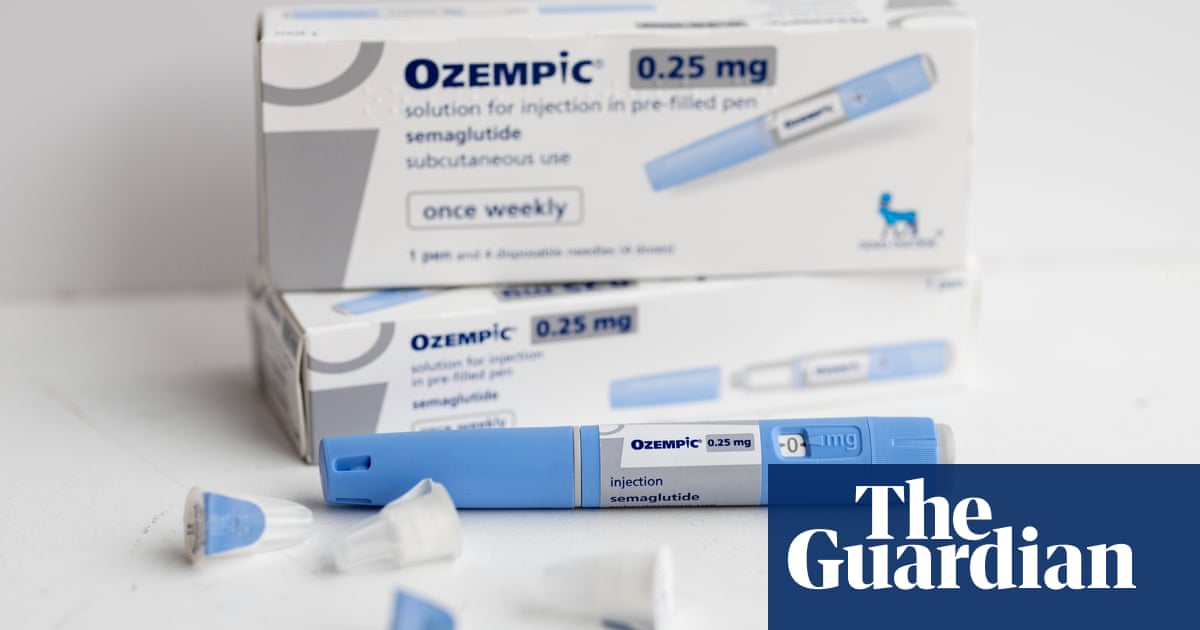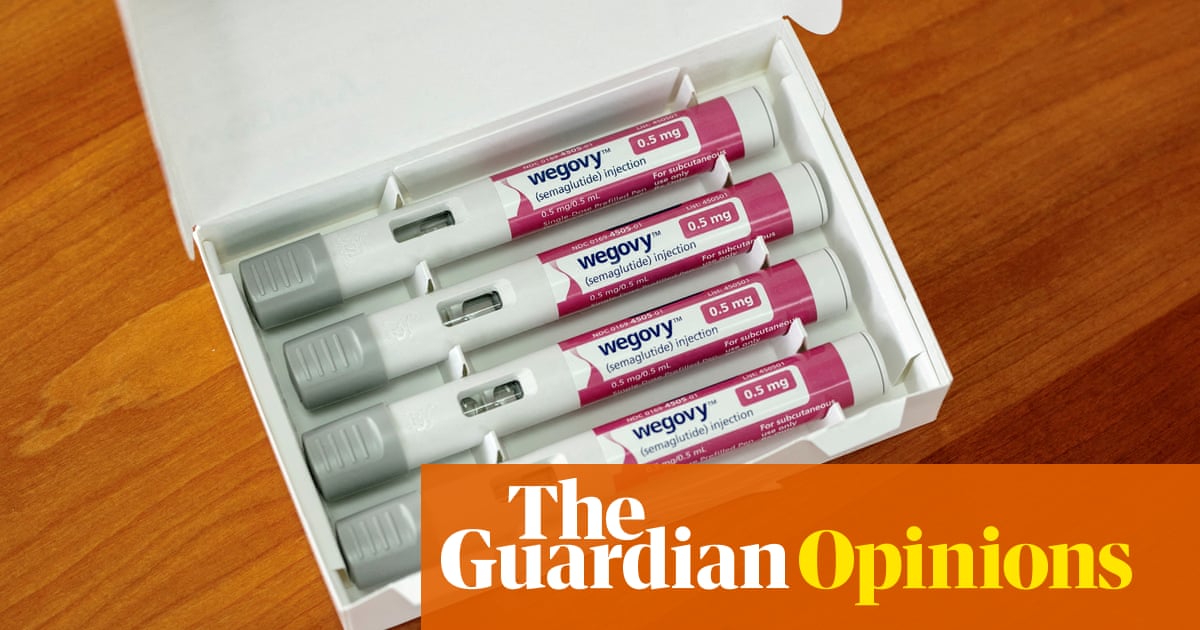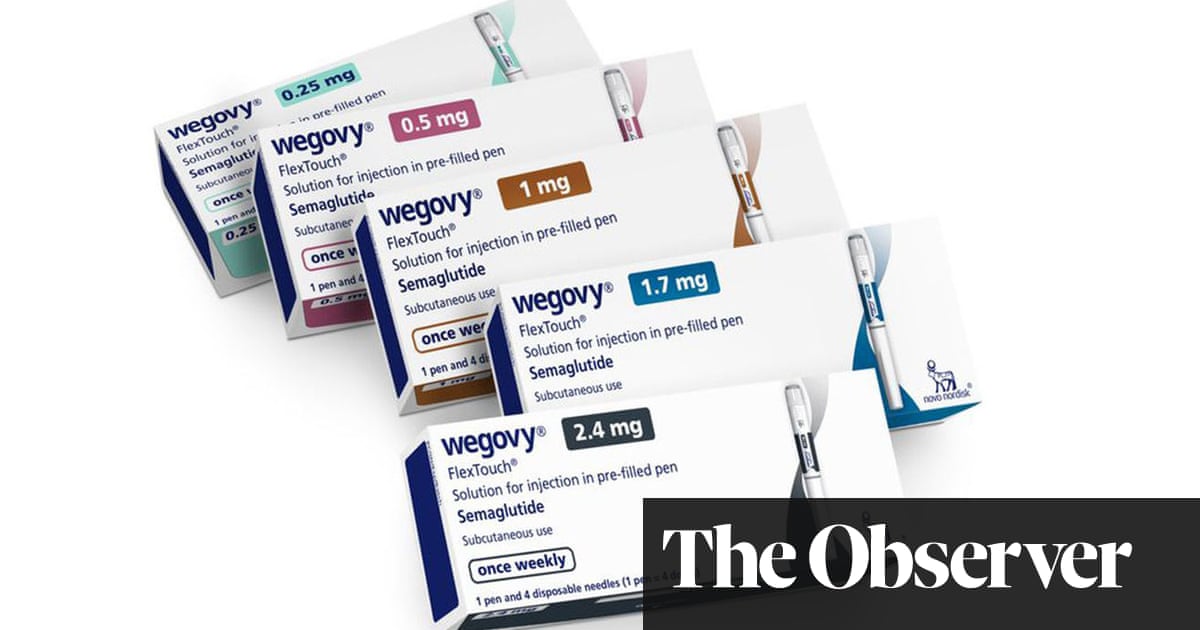
Medicines that enable dramatic weight loss are likely to experience a new boom in uptake, experts have said, as the first generic versions hit the market this week at a lower cost than the original drugs.
The injections, dubbed “skinny jabs” by the media, can help people lose more than 10% of their body weight and have become hugely popular in recent years, with celebrities lauding their effects.
They include Wegovy and Saxenda, which are licensed for weight loss, and Ozempic and Victoza which are licensed for type 2 diabetes but are often prescribed “off-label” as a weight-loss aid. All four mimic a gut hormone called GLP-1 and are produced by the Danish pharmaceutical company Novo Nordisk.
It announced on Tuesday that it was to invest more than $4bn (£3.2bn) in US plants manufacturing the injectable drugs to try to meet booming demand.
While such treatments are available to some patients on the NHS, private access is expensive, and recent shortages have made them hard to get hold of. But change is afoot.
Patents for Victoza and Saxenda have expired, according to Novo Nordisk. As a result, other drugmakers are working on generic versions. Israel’s Teva Pharmaceutical Industries the world’s largest generic drugmaker, launched a generic version of Victoza in the US on Monday.
The move comes days after the US regulator, the Food and Drug Administration, tentatively approved London-based Hikma Pharmaceuticals’ generic version of Victoza.
They are not alone: among others reported to be planning to launch their own generic liraglutide products (the active ingredient in Victoza and Saxenda) are Pfizer, Viatris’s Mylan and Novartis’s Sandoz.
Such drugs are cheaper than the originals. According to Teva, the wholesale acquisition cost (WAC) of its new generic will be 13.6% lower in price than Victoza at $469.60 for the two-pack and $704.40 for the three-pack.
“WAC pricing does not account for the price discounts offered to customers and is not reflective of our final net price,” a company spokesperson said.
But this is only the beginning, with Ozempic and Wegovy both losing patent protection in China in 2026, in Europe and Japan in 2031, and in the US in 2032.
Prof Giles Yeo of the University of Cambridge said generic versions will lead to a further boom in use – particularly in lower-income countries. “Rich people will always want the shinier new drugs,” he said, adding that newer medications will probably have fewer side-effects.
Mark Samuels, the chief executive of the British Generic Manufacturers Association (BGMA), described the first wave of generic weight-loss medicines as a “potentially transformative opportunity for public health”.
“The current market is largely private via patients who are self-paying,” he said. “The cost of the patented medicine is often prohibitive for the NHS, so it has been sparingly prescribed by clinicians. However, the onset of generic competition will likely significantly reduce the price, and this means the NHS can afford to treat more patients. This has a broader population health benefit as greater access to these medicines will reduce the crippling strain obesity-related conditions have on NHS resources.”
In the UK, generic competition typically reduces prices paid by the NHS by as much as 80% to 90% after loss of exclusivity, according to the BGMA.
Dr Simon Cork of Anglia Ruskin University said competition in the form of new medications will also play a big role in any future pricing arrangements of those that now exist. Eli Lilly’s diabetes drug Mounjaro has just been approved for obesity in the UK and it is developing another weight-loss drug, Retatrutide.
“Competition will, I suspect, reduce the cost of these medications, particularly since the drugs coming on to the market often display more favourable weight loss than semaglutide,” he said.
Victoza brought in £245m of sales for Novo Nordisk in the first three months of this year, down by 23% from a year earlier, while Saxenda’s first-quarter sales halved to £188m. Last year, Victoza made £982m of sales, down by 30% on 2022, while Saxenda posted revenues of £1.2bn, down 4%.
The Association of the British Pharmaceutical Industry has defended the use of patents as being vital to health breakthroughs.
Claire Machin, the industry body’s executive director of international policy and UK competitiveness, said developing drugs was a high-risk process, with the average cost of taking a medicine from discovery to launch put at $2.3bn last year.
“For every 10,000 compounds that are tested, only one or two will successfully pass all stages of research and development and clinical trials to become licensed medicines available to patients,” she said. “A strong intellectual property framework enables the development of cutting-edge medicines and sustains future innovation.”
While generic forms of Victoza are appearing this month, Yeo said the big turning point will be when semaglutide – the active ingredient of Ozempic and Wegovy – can be made as a generic. “A powerful drug will then be available to the vast majority of the world, which would be amazing,” he said.
Cork said any reduction in cost was to be welcomed, not least because at present GLP-1 analogues can only be prescribed for use for two years on the NHS for eligible patients. “This was introduced in no small part because of the questionable cost effectiveness of their continued use,” he said.
“A reduction in the cost would shift the balance of this cost effectiveness, potentially paving the way for their longer-term use – especially when coupled with research showing the reversal of weight loss after patient stop taking them, and the continued benefit in cardiovascular risk associated with longer term use.”
Dr Ivan Koychev of the University of Oxford, who is researching the application of GLP-1 analogues in dementia patients, said demand for such drugs was currently outstripping supply as a result of the high prevalence of obesity and type 2 diabetes.
“This is evidenced by members of the public sourcing these medications online or attempting to reconstitute the drugs themselves,” he said.
While it is unclear how widespread the practice is, internet forums including Reddit have numerous examples of people reporting that they have been injecting themselves with such “DIY” preparations.
However, experts have warned the approach is dangerous, with some people taking unlicensed versions of semaglutide ending up needing emergency hospital care after buying from unregulated online sellers without a prescription.
Yeo said the availability of cheaper generic versions of drugs such as semaglutide could help to tackle the problem. “Becoming a generic will make its supply far safer, because that would undercut the hidden market in the product,” Yeo said. “We’ll also have far more information about its long-term safety profile, which can only be a good thing.”












